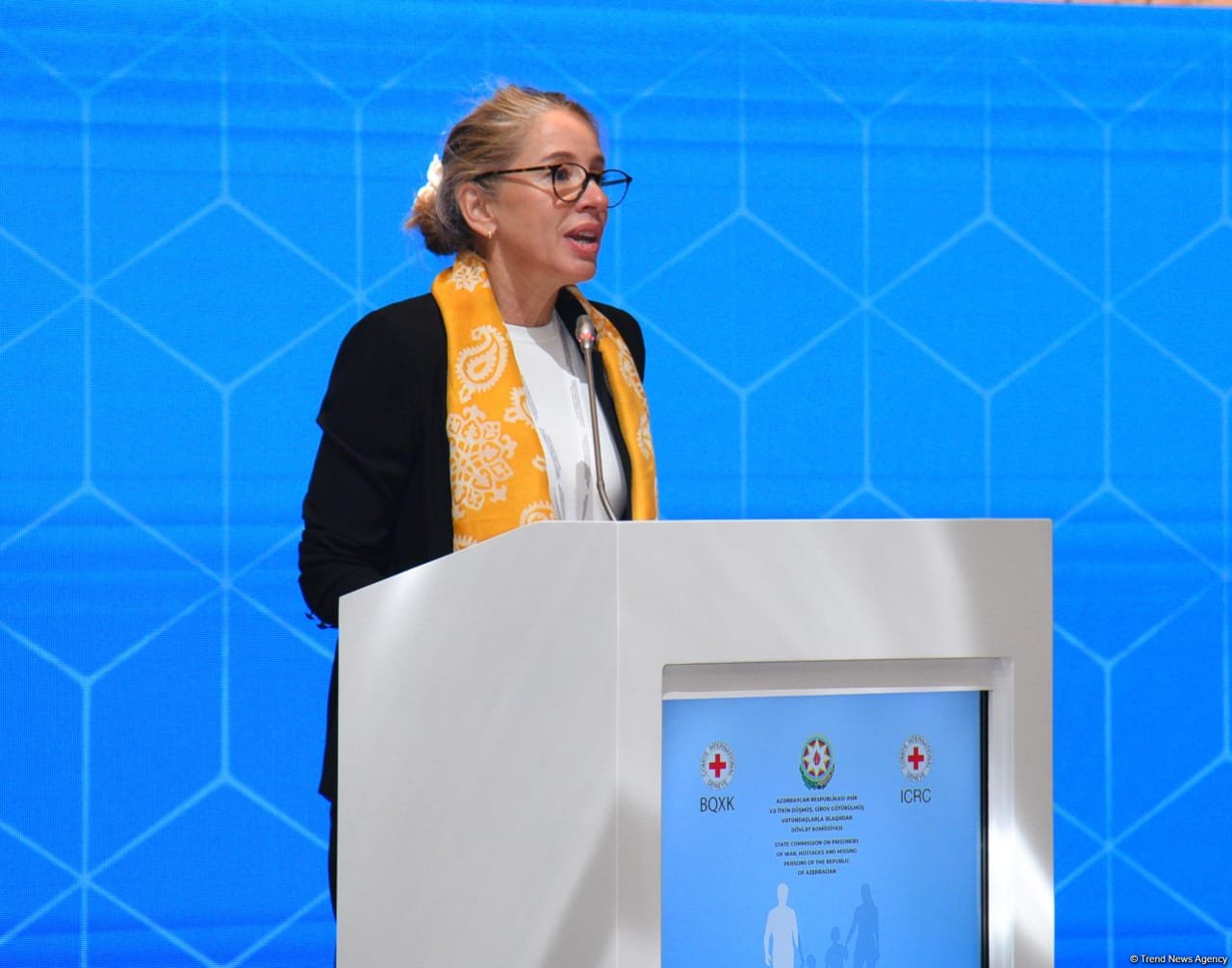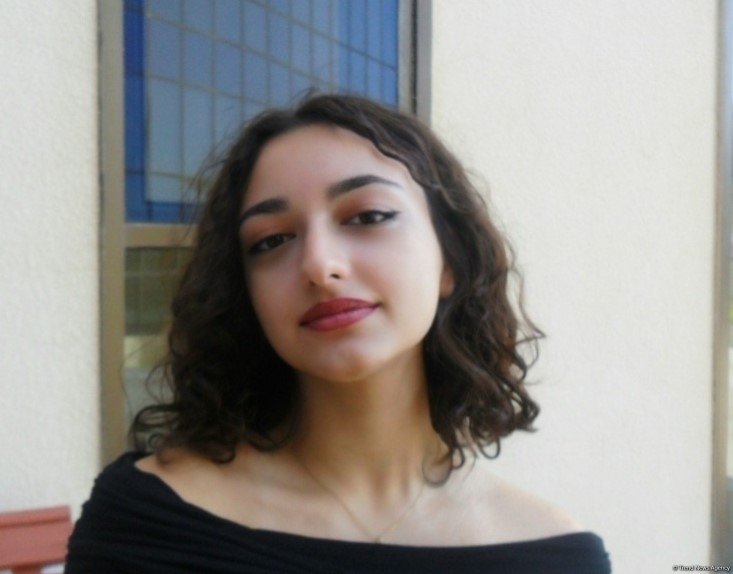BAKU, Azerbaijan, October 2. Appreciation is extended to Azerbaijan for its involvement in addressing the issue of missing persons in armed conflicts, both as a nation impacted by this issue and as a proponent in international forums, Head of the Central Agency for Search and Restoration of Family Links of the International Committee of the Red Cross (ICRC) Florence Anselmo said at an international conference in Baku on “Addressing the Issue of Missing Persons: Upholding Families’ Right to Know the Truth,” Trend reports.
"Your excellencies, ladies and gentlemen,
I would like to start by telling you a story. One story among many others that I have heard working with the ICRC.
Maryam is a mother, of a 19 years old son. They live in a country where the situation is unstable, there is a conflict ongoing. One day Youssef leaves home to fetch grocery. And Maryam waits for his return, but Youssef never comes back. 20 years later, Maryam is still waiting to hear news about him. She has looked everywhere. Asked everyone. She took a lot of risk traveling to dangerous places to find information. She went to fortune tellers to know if he was still alive. She has lost vast amounts of money to people who were promising to give her information. She believed for a long time that Youssef was a prisoner in a secret prison. She thought she recognized him one day on a photo in the newspaper, but it turned out it was someone else. 20 years later, Maryam’s emotions go up and down everyday, between hope and despair. Her health has deteriorated over the years. She has spent most of her savings and faces difficult times. Many family members started avoiding her because they don’t want to speak about this old story anymore.
Maryam finally joined a group of other families with a trained accompanier. This helped her to make sense of her feelings, and find support to cope with her life...
But she is still waiting for an answer.
The story of Maryam and Youssef is the story of tens of thousands of families, in the Caucasus, the Balkans, Colombia, Georgia, Iraq, Lebanon, Russia, Syria, or Ukraine and all across the globe, who suffer the consequences of disappearance. And their story impact whole communities and societies, making peace and reconciliation harder to reach.
Global trends are extremely worrying: as conflicts continue to rage across the globe, polarization is on the rise, and with dehumanizing narratives, humanitarian action is often blamed for the failure of states in assuming their responsibilities under IHL and IHRL.
Preventing and addressing cases of missing persons is first of all the responsibility of states and conflict parties. In this regard, early action is key, to include the issue of missing persons from the outset in responses to emerging and ongoing conflicts. This can help avoid or reduce caseloads that will haunt societies for decades to come.
Where people have gone missing, states need to have long-term political will to resolve cases and address the consequences suffered by affected families and communities. And there are many contexts represented in the room here today that can serve as successful examples in this regard.
A key resource in the missing persons context concerns medico-legal capacities to search for missing persons, recover the deceased, and undertake multidisciplinary identification when required. It is equally crucial that affected families are accompanied and supported so that they can cope financially, administratively, economically, and psychologically with the burden of their loved ones’ absence.
None of this is easy, nor straightforward. Clarifying the fate and whereabouts of missing people and addressing the needs of their families, often means taking a long, difficult, and painful path. It is a path that may seem, in the eyes of the public, as engaging with “the enemy”, and that requires political courage. But it is the right path, and a path that the authorities, jointly with the families, need to continue engaging on.
As the ICRC, we have a mandate under the Geneva Convention to support states in implementing their obligations and to act as a neutral intermediary, such as in the exchange of information on missing persons.
We also have decades of experience in how to conduct search and identification processes and we work with former and current conflict parties around the world, contributing advice and expertise. I am delighted to see so many of our past and current partners assembled in this room.
Where conflict parties have shown political commitment and respect of their international legal obligations, we have been able to achieve important progress together, giving answers to hundreds, even thousands, of families. Elsewhere, we persist in our engagement in the hope that more favorable circumstances will one day allow families to end uncertainty.
As we embark on an intense day of discussions, allow me to commend our hosts, the Republic of Azerbaijan, for their long-standing engagement on the issue, not only as a country affected but as a champion on the issue in international fora, including as penholder of the biennial GA resolution on Missing Persons in armed conflict.
Azerbaijan is also an important member of the Global Alliance for the Missing, a unique group of states working with ICRC to promote a more determined global response to the issue and I welcome the participation of several other member states in this event.
Since we last met for this conference in 2023, we have not stood still. Earlier this summer, an important resolution on missing persons, sponsored by Kuwait, a Global Alliance Member, was adopted by the Organisation of Islamic Conference, adding to an already impressive framework of norms and political commitments around missing persons in armed conflict.
Today, more than ever, implementation is crucial. Current conflicts in different parts of the globe are producing vast new caseloads of missing persons. Respect for critical IHL obligations is often lacking. And the space for humanitarian actors to fulfil their mandate has never been more restrained. This conference is a unique opportunity not only to take stock but also to bring new energy to collectively work towards a more effective response," Florence Anselmo said, as she spoke at the event.
Baku is hosting an international conference on “Addressing the Issue of Missing Persons: Upholding Families’ Right to Know the Truth.”
The event started with an address by President of the Republic of Azerbaijan Ilham Aliyev to the participants of the conference, which was read out by Ali Naghiyev, Head of the State Security Service of Azerbaijan, Chairman of the State Commission for Prisoners of War, Hostages, and Missing Citizens.
The head of the International Committee of the Red Cross (ICRC) Central Agency for Search and Restoration of Family Links Florence Anselmo, Deputy Foreign Minister of the Republic of Azerbaijan Fariz Rzayev, Deputy Minister of Family and Social Services of the Republic of Türkiye Zafer Tarikdaroglu and other officials are also taking part in the event.
The event is taking place today in Baku and will continue tomorrow in the liberated territories of Azerbaijan.
Stay up-to-date with more news on Trend News Agency's WhatsApp channel







